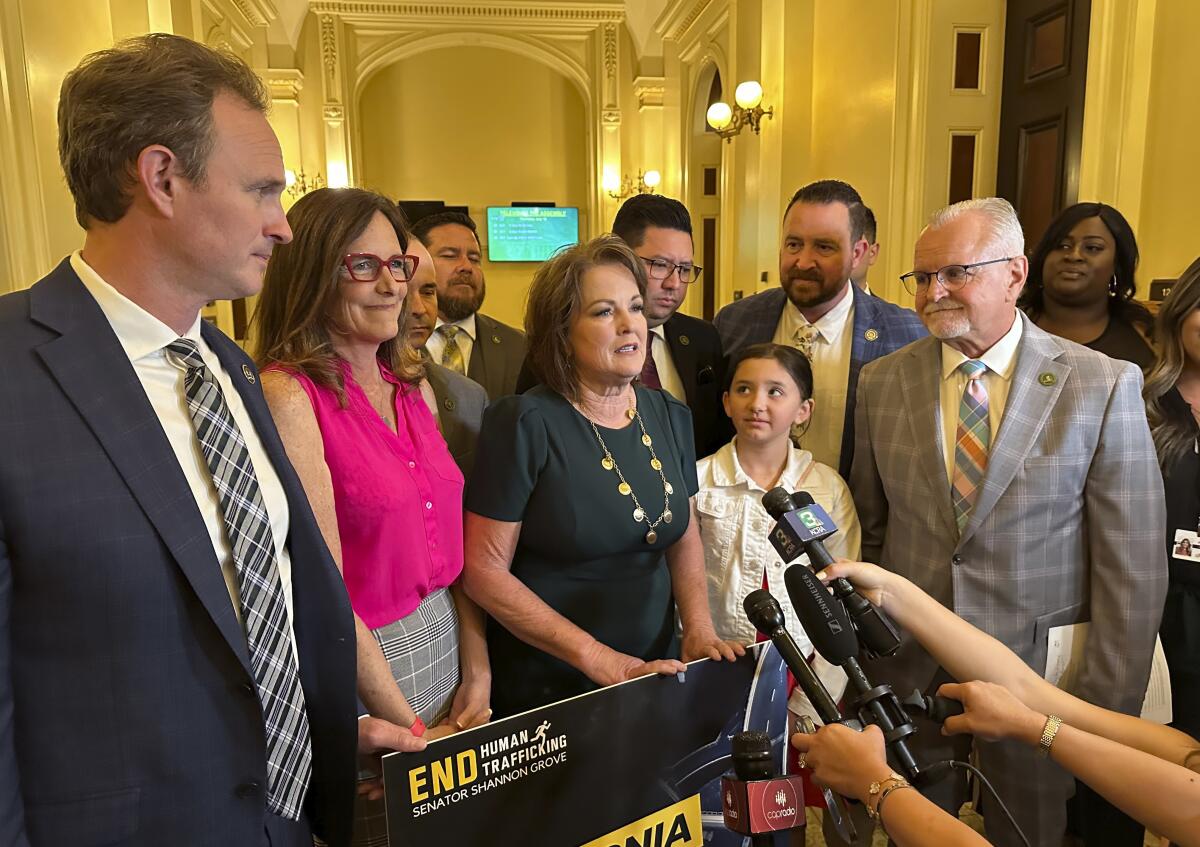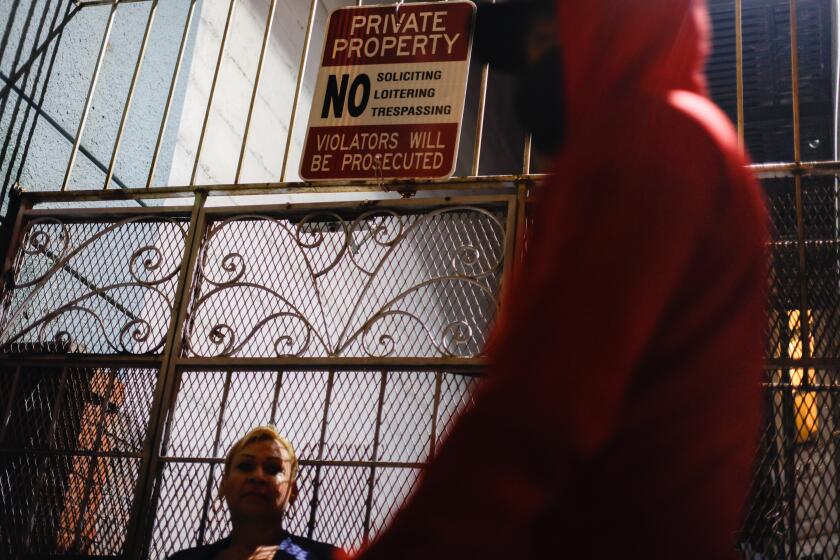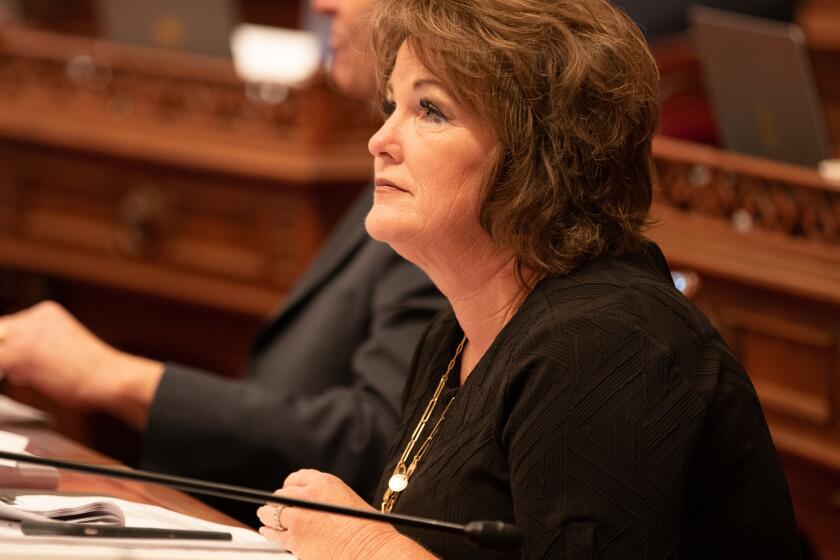Newsom signs child sex trafficking bill that exposed cracks in prison reform efforts

- Share via
California Gov. Gavin Newsom signed a bill Monday that will increase penalties for those convicted of child sex trafficking, a seemingly straightforward measure that instead divided Democrats over how to handle crimes that disproportionately affect women and children.
Senate Bill 14 will reclassify sex trafficking of minors as a “serious” felony, potentially resulting in a life sentence under the state’s “three strikes” law, which also applies to crimes such as murder and rape. The measure earned unanimous approval from the 80 members of the state Assembly and the 40-member Senate.
“Human trafficking is a sick crime. With this new law, California is going further to protect kids,” Newsom said in a statement after he signed the bill in Sacramento alongside trafficking survivors, First Partner Jennifer Siebel Newsom and SB 14’s author, state Sen. Shannon Grove (R-Bakersfield).
“With the passage of this bill, we are sending a clear message to child traffickers — we intend to put you out of business and behind bars where you belong,” said Grove, who worked on the issue for years.
California lawmakers sent Gov. Gavin Newsom a controversial bill Wednesday to increase penalties for child sex traffickers.
Despite its eventual passage, Democratic concerns over whether victims would be vulnerable to prosecution and whether three strikes should be broadened nearly tanked SB 14, leading to a public relations nightmare for the majority party and a rare Republican victory in the state Capitol.
The controversy also revealed cracks in the criminal justice reform movement over not just human trafficking but other crimes such as domestic violence and certain sexual assaults — politically sticky issues for Democrats who have touted policies supporting women but resisted efforts to increase the prison population.
“I think the resistance is healthy. When we’re talking about adding prison time, adding crimes, we ought to be thinking long and hard about it,” said Maggy Krell, a prosecutor who specializes in human trafficking.
But, Krell added, “we’re talking really about gender-based violence here. We’re talking about crimes that disproportionately impact women and children, and women and children of color.”
Lawmakers this year also disagreed over a bill to lengthen prison terms for those convicted of domestic violence and another that would have eliminated a requirement for healthcare providers to report assault and abuse to law enforcement. Both measures failed. The Legislature in recent years has also fought over adding a penalty for removing a condom without consent and the repeal of an anti-loitering law that largely affected sex workers.
“California leads the way in many things. But we don’t lead the way in women leadership,” said state Sen. Marie Alvarado-Gil, a moderate Democrat from Amador County who authored a bill this year to make rape of an intoxicated person a “violent felony” subject to three strikes sentence enhancements. Alvarado-Gil held the bill over concerns it could face resistance similar to SB 14.
Though the debate is “uncomfortable,” Alvarado-Gil said, “we cannot shy away from what is the ugliest part of our human society.”
California Gov. Gavin Newsom signed a bill to repeal an anti-loitering law, which many see as the first step toward full decriminalization of sex work.
The years-long tension reached a boiling point in July, when Democrats on the left-leaning Assembly Public Safety Committee rejected SB 14 over criticism that it would lead to the prosecution of victims and refill prisons.
The decision prompted public outrage against Democrats and interference from Newsom and Assembly Speaker Robert Rivas (D-Hollister), who both called for compromise and a quick resolution. Facing political pressure and even death threats, Assemblymember Reggie Jones-Sawyer, a Los Angeles Democrat and chair of the Public Safety Committee, resurrected the bill with a new hearing and quickly passed it.
Progressive Assembly Democrats eventually won some amendments to the bill in another hearing earlier this month, which exempted trafficking victims from the serious felony provision. Those changes eased concerns over potential prosecution of survivors and ensured the unanimous approval of the bill, which takes effect Jan. 1.
“We are failing [victims] when we say to the world we’re going to go soft on people who prey on children,” said former Sacramento Dist. Atty. Anne Marie Schubert, who left the Republican Party and later ran as an independent for attorney general in 2022. “I’ve read a couple of the arguments that there is no evidence that a longer-term sentence is going to reduce crime. Yes ,it does, because they’re in jail.”
Opponents of SB 14, including some of the state’s leading criminal justice reform advocates, said the measure was overly simplistic and that sending people to prison for longer was not the answer.
“Any bill that touches on sex offenses has always been a hot political item,” said Natasha Minsker, a policy advisor to the left-leaning public safety organization Smart Justice California. “We are approaching the conversation from a completely wrong direction if we say we’re going to just increase penalties and we’re going to prosecute our way out of it.”
What gets lost in the political chaos, some advocates and legal experts said, is what’s best for the victims.
“Regardless of how much time we are going to see for defendants, we need to be looking at, No. 1, what are we doing to prevent this crime in the first place?” said Krell, who supported SB 14. “And No. 2, what are we doing to help the victim and help the survivor recover?”
“There was a lot of politics overtaking policy on [SB 14],” Atty. Gen. Rob Bonta added in an interview with The Times on the final night of this year’s legislative session on Sept. 14. “Some folks have only had one move, one tool in their toolbox. And they use it all the time. And it’s just more and more never-ending punishment.”
Bonta said it’s not that human trafficking and other sex crimes aren’t serious or violent, but that California needs to approach these issues more carefully than in decades past, when the state ushered in tough-on-crime policies that incarcerated tens of thousands of mostly Black and brown people.
Supporters of SB 14 often forget that convicted human traffickers of minors can already go to prison for up to 12 years, or 15 years to life if the crime involves, among other factors, force, coercion or violence, Bonta said.
“There’s a balance there,” he said. “I don’t think three strikes is the right move for California.”
A key panel passed the bill two days after killing it, reviving what had been a bipartisan effort to crack down on people who repeatedly traffic children.
Others see SB 14 as a chance for victims to have a seat at the table in crafting similar policies, and for lawmakers to see what more is needed to not only prevent crime, but also provide care for survivors.
“I highly respect both sides, and I totally understand where they’re coming from,” said Debra Rush, a child sex-trafficking survivor and founder of the Fresno organization Breaking the Chains, who supported SB 14.
“I think that this is where change happens,” Rush said. “I think that when we try to shut out one group or another ... I think that’s where we end up with mayhem.”
More to Read
Sign up for Essential California
The most important California stories and recommendations in your inbox every morning.
You may occasionally receive promotional content from the Los Angeles Times.

















